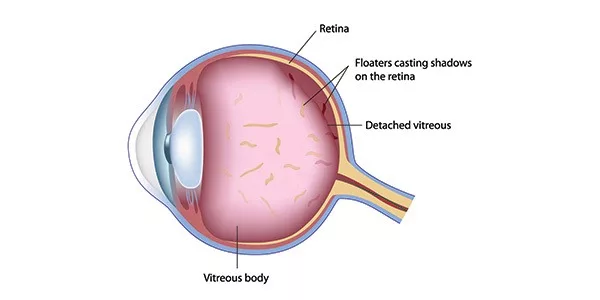As we get older, our vision starts to change. Many develop vision errors like nearsightedness or farsightedness. Everyone eventually develops cataracts. And some even start to notice floaters and flashes in their vision more and more frequently. Floaters and flashes in the eye are completely normal to experience as we age and are typically not dangerous. But on rare occasions, these can be warning signs of something more severe.
About Eye Floaters
If you’ve ever noticed little dots, or squiggles in your vision, that seem to float away when you try to focus on them directly, those are most likely eye floaters.
What are eye floaters?
Some people liken floaters to specks, clouds, or cobwebs moving around in their fields of vision. And while it can seem like these little designs are floating in front of your eyes, they are actually within them. What you are seeing is the shadows cast on your retina.

Floaters are actually little clumps of gel or cells inside the vitreous humor or gel (the jelly-like fluid that fills your eye) of your eye. Over the years, this vitreous gel may start to thicken and shrink, which can result in clumping. This results in what we perceive as floaters.
What causes eye floaters?
While changes to the vitreous humor is completely normal, other things can cause floaters. Noticing a few eye floaters is normal for the average person. However, there are several factors that can increase their severity, including:
- Eye trauma
- Nearsightedness
- Diabetic retinopathy
- Eye inflammation
- Complications following eye surgery
Many of these factors will be followed by symptoms such as eye pain, peripheral vision loss, and/or blurred vision. If eye floaters do suddenly become more frequent, it could mean there is a more severe issue at hand. If you are experiencing an immoderate number of floaters, contact your eye doctor as soon as possible.
Are eye floaters dangerous?
In most cases, floaters are normal and completely harmless to your overall vision quality and eye health. However, in rare cases, eye floaters could be a sign of a more serious issue such as:
- Hemorrhaging
- Swelling of the back of the eye
- Bleeding in the vitreous humor
- Eye infections
- Ocular tumors
- Retinal detachment
- Various medications
These causes and conditions require immediate intervention by an eye doctor.
About Eye Flashes
If you have witnessed what seem to be flashing lights or lightning streaks in your field of vision, you’ve probably experienced flashes.
And what about eye flashes?
People typically describe flashes as small flashes of light that resemble lightning or sparkles in front of your eye. Many patients liken the sensation to the flashing lights they perceive after experiencing a hit to the eye and seeing “stars.” Flashes can be instant and fleeting, or last as long as ten to twenty minutes. Plus, they can persist on and off for weeks or months.
What causes eye flashes?
Flashers can be caused by a few different things, but they are most commonly caused by the rubbing or pulling of vitreous gel. As mentioned before, as we age, the vitreous gel can break down and lose its “gel-like” consistency. This can result in shrinkage, which can then tug at your retina and produce the flash.
When are eye flashes dangerous?
Again, in most cases, eye flashes are harmless. However, sometimes they can be signs of a more serious condition such as retinal tearing. Occasionally, this pulling and tugging of the vitreous gel can cause a tear in the retina. A retinal tear is serious and can result in permanent vision loss if not addressed quickly.
If you notice the sudden appearance of light flashes, contact your ophthalmologist immediately.
Eye Floaters and Flashes Treatment
Despite their prominence and annoyance, eye floaters and flashes are a natural part of the aging process. And because they are natural and harmless, there is no treatment to remove them from your vision. If you find floaters to be a mild distraction, you can try to move them out of your line of sight by looking side to side and up and down. Eye floaters and flashes usually fade and become less noticeable over time.
However, if you experience a sudden increase in the frequency or amount of eye floaters or flashes, you should contact your eye doctor immediately. While floaters and flashes are themselves harmless, they may be signs of a more serious condition that only a licensed ophthalmologist or optometrist can diagnose and treat.
Frequently Asked Questions Related to Eye Floaters and Flashes
How common are flashes and floaters?
Very common. Over 70% of people worldwide experience them.
Does eye strain, nutrition, general health, smoking, or emotional stress contribute to flashes and floaters?
No, there is no known relationship between flashes or floaters and any of these problems.
Can anything be done to stop eye floaters?
No, nothing can be done to prevent floaters. If floaters bother you, move your eye around to move any visible floaters out of the way. Most will fade over time.
Are there any medications or eye drops I can take?
No, there aren’t any medicines, eye drops, vitamins, herbs or diet that can treat eye flashes or floaters.
If one eye develops flashes or floaters will the other develop them as well?
Very likely. In the case of a posterior vitreous separation, it is very common for the same condition to occur in the second eye within a year. For this reason, and because flashes and floaters are sometimes caused by retinal breaks, contact your eye doctor as soon as possible when flashes or floaters develop in either eye.
Do floaters and flashes eventually disappear?
Flashes will almost always go away completely. It usually takes about a month, but sometimes it can take up to six months. Floaters will gradually get smaller and less noticeable as the weeks and months go by, but usually they never disappear completely.
